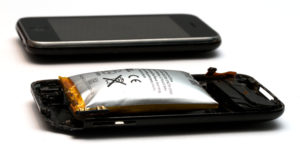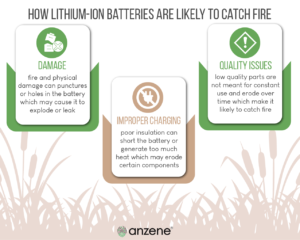
In this day and age where portable energy is the norm, lithium-ion batteries power almost everything (Jhaveri, 2022). From smartphones, portable gadgets, electric cars, and even the International Space Station, the widespread use of lithium-ion batteries have projected the industry to reach 100.4 billion USD by 2025.
In this article, we’ll look at what lithium-ion batteries are and whether or not older ones are more likely to catch on fire.
How do lithium-ion batteries work?
A regular lithium-ion battery has three main parts: the electrodes, electrolyte, and separator (Yang, 2021). When the battery is in use, energy is released when the lithium-ion particles move from the negative electrode to the positive electrode. When the battery is charging, the lithium-ions flow in the opposite direction.
The main reason why lithium-ion batteries are the preferred mode of energy storage is because of the high energy output for a small weight of battery (Jhaveri, 2022).
Because lithium-ion batteries are manufactured to produce high output with minimal weight, this has caused their major drawback: which is that they are highly sensitive to heat, which may cause them to combust very easily (Helmenstine, 2019; Jhaveri, 2022).
Lithium-ion batteries are made to have thin partitions in between cells and a thin outer covering in order to be lightweight (Helmenstine, 2019). While modern-day battery safety has minimized the risk of lithium-ion batteries catching on fire, any small manufacturing defect may cause it to catch on fire.
Are old lithium-ion batteries more likely to catch on fire?
The simple answer is yes.
Aside from manufacturing defects, there are a bunch of other reasons why lithium-ion batteries are more likely to catch on fire. The older the battery is, the more likely it is to have the following issues (Jhaveri, 2022).
1. Damages
The lithium-ion battery is a delicate design and any damage may cause an unwanted incident. If the battery has been stored near heat or fire for a while, it may cause damage. Another reason which may cause damage is high-voltage charging or excessive discharging.

Aside from the two mentioned above, lithium-ion batteries are also susceptible to physical damage. Any puncture or hole in the battery pack may cause it to explode. This is why you are advised to take your lithium-ion-powered electric car to the proper servicing company after a car accident or any minor external force so that the battery is checked for any damages. This is also why you are not advised to use a severely damaged phone as the battery pack might have been damaged as well.
The older a battery is, the more likely are the components to be damaged.
2. Improper charging
If the battery that you are using has cheap components and poor insulation, it may short the battery or generate too much heat than the battery is designed to do. This is why you are advised to only use the phone charger that comes with your phone as fake or ingenuine ones may use poor insulation.
The older the battery, the more likely it is that the components have eroded especially if you have been using a fake charger to charge it for a long time.
3. Low-quality manufacturing
If the manufacturing is low in quality, the components are not meant to last and will erode with use. The older you use a low-quality lithium-ion battery, the more likely it is to catch on fire as the components are no longer in top shape for battery safety.

References:
Helmenstine, A. M. (2019, August 14). The Reason Lithium Batteries Catch Fire and Explode. ThoughtCo. https://www.thoughtco.com/why-lithium-batteries-catch-fire-606814
Jhaveri, J. (2022, May 12). Battery Safety : Top 5 Reasons Why Lithium-Ion Batteries Catch Fire. ION Energy. https://www.ionenergy.co/resources/blogs/battery-safety/
Yang, H. (2021, August 24). Explainer: Are lithium-ion batteries in EVs a fire hazard? Reuters. https://www.reuters.com/business/autos-transportation/are-lithium-ion-batteries-evs-fire-hazard-2021-08-23/